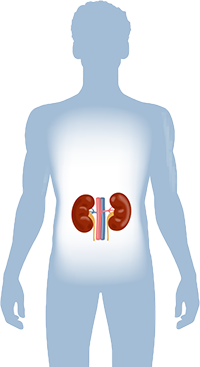What do the Kidneys Do?

The kidneys are fist-sized organs located in the middle of your back below the rib cage, and have a number of vital responsibilities in keeping your body healthy and running properly.
Waste Removal:
Waste in the blood comes from normal breakdown of muscle and from food you eat. Once your body uses what it can from food you consume, what is left becomes waste that is filtered by the kidneys. The kidneys process the waste into a state that can then be safely moved into the urinary system and eventually excreted from the body.
Water Level and Chemical Balancing:
In acting as the body’s filter, the kidneys filter out important chemicals needed for normal functioning, and release them back into the blood for the body to use. Because of this, the kidneys are also responsible for regulating the body’s level of these critical substances.
Blood Pressure Regulation:
Because they filter the blood the kidneys need continuous pressure. When blood pressure drops too low, the kidneys can produce chemicals and proteins that help restore normal blood pressure so they can continue doing their job.
Red Blood Cell Regulation:
If the kidneys aren’t getting enough oxygen, they release a hormone that stimulates the bone marrow to produce more oxygen-carrying red blood cells.
What is Kidney Disease?
Kidney disease occurs when the kidneys are damaged and can’t filter blood properly, leading to waste build-up in the body. Unfortunately, kidney disease is on the rise. According to the National Institute of Diabetes and Digestive and Kidney Diseases (NIDDKD), more than 20 million Americans may have kidney disease, and even more are at risk.
| Types of Kidney Disease | |
|---|---|
|
Chronic Kidney Disease |
Acute Kidney Disease |
|
|
|
|
In the majority of people with kidney disease, the damage occurs slowly over the course of many years due to risk factors such as diabetes or high blood pressure; this type of kidney disease is called chronic kidney disease.
While kidney disease can be treated if detected early, the disease often gets worse over time and can lead to kidney failure. It’s important to be aware of the risk factors.
Risk Factors for Kidney Disease
Kidney disease can occur in anyone, regardless of age or race. Unfortunately, a person with kidney disease may not feel sick or different until the disease is very advanced, so it’s important to be aware of the risk factors so that you can stay healthy.
According to the NIDDKD, certain age groups are at a higher risk for kidney disease:
- The incidence of CKD is increasing most rapidly in people ages 65 and older.
- The incidence of recognized CKD among 20- to 64-year-olds is less than 0.5 percent.
For additional kidney disease statistics in the United States, visit the National Institute of Diabetes and Digestive and Kidney Diseases (NIDDK) website.
The primary risk factors for kidney disease are:
- Diabetes
- High blood pressure
- Cardiovascular disease
- Family history of kidney failure
Because these conditions can be chronic, kidney disease can be developing slowly over the course of many years.
Blood and urine tests are the best way to find out if you have kidney disease.